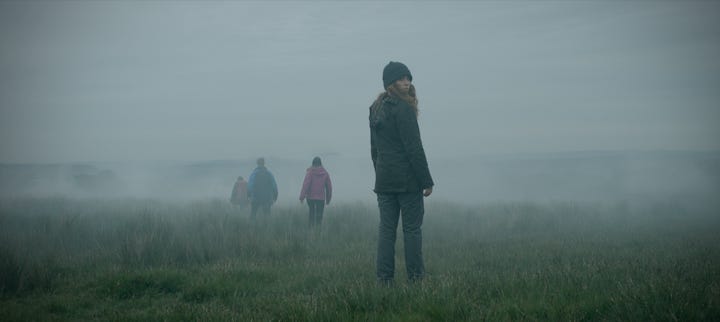The Moor was screened at the Darkness in the Fields film festival on the 23rd of March at the Derby Quad Cinema.
Chris Cronin’s directorial debut, The Moor, is a remarkably accomplished piece of true crime and folk horror, putting the wild, unsettling landscape at the forefront of the story.
Working from a script by Paul Thomas, there is one obvious influence – the murders committed by Ian Brady and Myra Hindley. The fact that children are the victims and that bodies were taken to the moors and never found. As this horrendous part of modern UK history still resonates with many, especially those who grew up in the area, the film is already an uncomfortable watch.
Twenty-five years after a series of child murders, Claire (Sophia La Porta) has returned to her hometown and is approached by Bill (David Edward-Robertson) to help continue the search for the body of his son. He hopes that the effort will keep eyes on the case and block the potential release of the killer. Claire is also haunted by the past, having been the last person to see Bill’s son alive.
As the moors are too big an area to cover, Bill has enlisted the help of psychic Alex (Mark Peachey) and his daughter Eleanor (Elizabeth Dormer-Phillips). Eleanor’s powers far outweigh her father’s, and their combined efforts lead Bill and Claire to various discoveries.
While introducing the film at Darkness in the Fields, Cronin explained that the original treatment was for a found-footage film, something the director didn’t want to do. Some aspects of this style are still incorporated into the final product, with Claire recording the searches on the moors. While these moments add little to the story, they do work in establishing the atmosphere on the moors, with mist wrapping around the characters and no discernible landmarks anywhere to be seen.
The Moor builds to its folk horror moments, but most of the film is very much rooted in true crime. Even the use of psychics fits in with a long line of the sanctioned and unsanctioned use of people with supposed powers to locate bodies, or aid with the hunt of an unknown killer. All the cast provide wonderful performances, with La Porta burying the character’s trauma to support a grieving father – only letting the mask slip when she believes there are no eyes on her.
Edward-Robertson is excellent as well, weighed down by the task at hand. This is also helped by the tight scripting, that believably brings every piece of dialogue that Bill is involved with back around to the search for his son. As it would in real life, the lack of closure dominates everything.
And then there’s Dormer-Phillips, who is arguably given the most difficult role in the film. Having to interact with her familiar and respond to things that are unseen by the rest of the characters, she shines in this film – giving the young Eleanor a believable mix of youthful innocence and an almost forbidden knowledge beyond her years.
Before the screening, Cronin warned the audience that there would be no resolutions in the film and that is true. As with many films about cold cases and true crime, there isn’t a neatly wrapped-up conclusion. However, as we approach the finale, there are a few last-minute plot points which are not only left unresolved but are never even given a chance to develop. It’s hardly a spoiler to say that it is mentioned once that the killer has escaped police custody. This thread never goes anywhere and feels like something that was supposed to play into the ending but was dropped.
The quality of The Moor is such that even this feels like a minor issue. From start to finish, this film maintains its oppressive atmosphere, building to a truly unsettling, gut punch of an ending.
Director: Chris Cronin
Writer: Paul Thomas
Starring: Sophia La Porta, David Edward-Robertson, Mark Peachey, Elizabeth Dormer-Phillips







